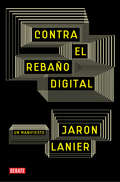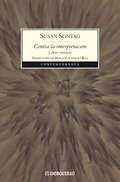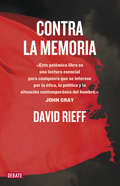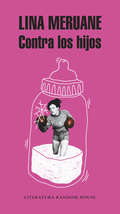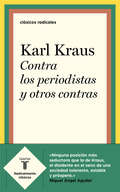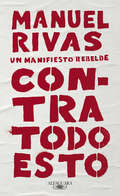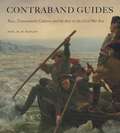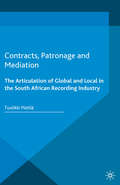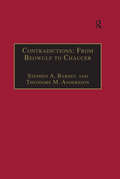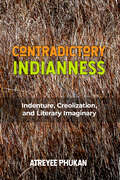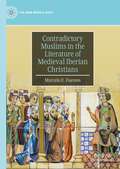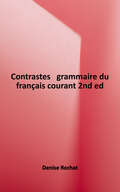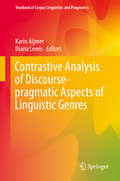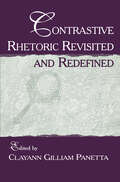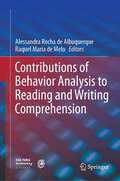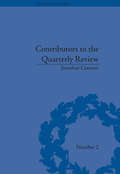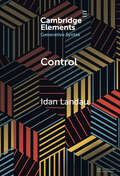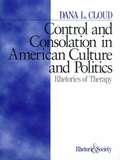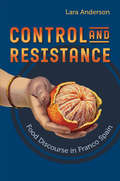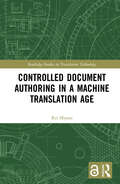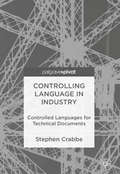- Table View
- List View
Contra el rebaño digital: Un manifiesto
by Jaron LanierEl fascinante manifiesto por un uso creativo de la tecnología de uno de los creadores de Internet. Contra el rebaño digital es uno de los libros que más han dado que hablar en los últimos tiempos: un aviso contra nuestra obsesión por la tecnología y, en concreto, por internet, escrito por uno de los expertos más estimulantes y visionarios. La temprana dedicación de Lanier a la realidad virtual y el desarrollo de tecnologías en red son legendarias, así como sus artículos, que atacan muchas de las cuestiones que el mundo de la tecnología considera sagradas. En este manifiesto, Lanier apunta contra lo que ha bautizado como la cultura nerd de internet o el «maoísmo digital», es decir, la tendencia de la comunidad tecnológica de primar la plataforma sobre el contenido y los ordenadores sobre las personas. En total contraste con los que saludan el triunfo del contenido generado por los usuarios, Lanier ve una internet desinformada y tediosa, en la que la cantidad se impone a la calidad y las buenas ideas son acalladas a base de gritos. Pero Contra el rebaño digital no es una diatriba antitecnológica. Es un manifiesto fresco y energizante dedicado a quienes la tecnología les inspira aunque les decepcione el modo en que es empleada. Lanier propone a los usuarios de la red frenar un poco, generar contenidos profundos en vez de llamativos y sacar el máximo partido de internet en vez de usarla ciegamente para todo. Reseñas: «Aunque Lanier no pertenece a mi generación, nos conoce y nos comprende bien, y ha escrito un libro breve y aterrador, Contra el rebaño digital, que se hace eco de mi propia incomodidad, pero partiendo de un conocimiento y una perspicacia reales, tanto en lo práctico como en lo filosófico.» Zadie Smith, The New York Review of Books «Lúcido, poderoso y persuasivo. Una lectura imprescindible para todos aquellos que observan cómo la red y la tecnología que usamos a diario están modelando la cultura y el mercado.» Michiko Kakutani, The New York Times «Este es el libro más importante escrito hasta la fecha sobre nuestro mundo cada vez más digitalizado. Será recordado como el manifiesto que salvó a la humanidad al límite de la extinción, o como el último mensaje inteligente de una especie obsoleta.» Douglas Rushkoff «Apasionante y estimulante. Un correctivo necesario en los salones de debates tecnológicos.» San Francisco Chronicle «Importante... Lo que subyace en el ciberpensamiento de Lanier es una fe fundamentalmente humanista en la tecnología.» Los Angeles Times «Para quienes quieren leer para pensar, y leer para transformar, Contra el rebaño digital es el libro con el que empezar la década. Crudo, alborotador e inesperado. Y también muy entretenido.» Times Higher Education Supplement «El libro fundamental para comprender el mundo después de Google.» The Stranger (Seattle) «Poético y profético, este puede ser el libro más importante del año. ¡Lee este libro y álzate contra la rigidez de la red!» The Times (Londres) «Inspirado, enojoso y totalmente necesario. Bienvenidos al primer gran llamamiento del siglo en defensa de un "nuevo humanismo digital" frente a la conformidad en red del ciberespacio.» The Independent «Un nuevo y convincente manifiesto... Lanier es el primer gran apóstata de la era de internet.» Newsweek
Contra la interpretación y otros ensayos
by Susan SontagEste libro reúne los ensayos más célebres de Susan Sontag, una obra imprescindible para el pensamiento contemporáneo. Publicado por primera vez en 1966, este celebrado libro de Susan Sontag, su primera colección de ensayos, se convirtió rápidamente en un clásico contemporáneo que ha tenido una gran influencia en el pensamiento sobre el arte y la cultura actuales, no solo circunscrita a Estados Unidos. Además del ensayo que le da título y el famoso «Notas sobre lo "camp"», Contra la interpretación y otros ensayos incluye textos originales y provocativos sobre Sartre, Simone Weil, Godard, Beckett, la ciencia ficción, el cine, el psicoanálisis y el pensamiento religioso contemporáneo. Reseña:«Los ensayos de Susan Sontag son grandes interpretaciones, incluso acontecimientos, sobre lo que está sucediendo realmente.»Carlos Fuentes
Contra la memoria
by David RieffUn imprescindible libro que cuestiona la necesidad de la memoria histórica. En esta candente y polémica obra el prestigioso intelectual estadounidense David Rieff presenta un conmovedor alegato contra nuestra pasión por el pasado. Analiza cómo la memoria colectiva sirve a la historia más nacionalista, y en su extremo, cómo la memoria de horrores pasados enciende profundos odios étnicos, violencia y guerras. Las matanzas que Rieff presenció en Bosnia tiñeron de sangre para siempre la idea del recuerdo. Este libro es el resultado de esa experiencia. Al cuestionar esa idea central de muchas sociedades, Contra la memoria provocará inevitablemente muchos debates. «En las colinas de Bosnia aprendí a odiar pero sobre todo a temer la memoria histórica colectiva. En su apropiación de la historia, que ha sido mi pasión más sostenida y mi refugio desde la infancia, la memoria colectiva logra que la historia misma se parezca más que a nada a un arsenal lleno de armas necesarias para mantener las guerras o hacer de la paz algo tenue y frío.» Reseña:«Este polémico libro es una lectura esencial para cualquiera que se interese por la ética, la política y la situación contemporánea del hombre.»John Gray «Un libro breve y contundente.»Fernando Savater
Contra los hijos
by Lina MeruaneUna provocadora y perspicaz diatriba sobre la maternidad y el papel de la mujer en la sociedad Un ángel maléfico recorre impune nuestras conciencias: es el mensajero de la procreación. En esta diatriba Lina Meruane examina el retorno de este "ángel" que, amparado en la retórica ecologista, hace imperiosos llamados a la prolongación de la lactancia, la crianza intensiva y una infinita lista de prescripciones. De su polémico análisis sobre uno de los temas más determinantes y peor discutidos de nuestro tiempo se derivan observaciones sobre el estatuto de la pareja contemporánea, la discriminación laboral de las mujeres y los actuales sistemas educativos. Rudo e impío, y cargado de humor, Contra los hijos cuestiona los discursos culturales que promueven la preeminencia del hijo y lo llevan a ocupar un lugar despótico en el siglo XXI. "Lo dice bien Meruane: vivimos jalonadas entre la casa y el trabajo, la obligación de ser madres y la necesidad de libertad bajo un sistema de control constante". Patricia de Souza, Babelia, El País
Contra los periodistas y otros contras
by Karl Kraus«Ninguna posición más seductora que la de Kraus, el disidente en el seno de una sociedad tolerante, estable y próspera.»Miguel Ángel Aguilar «Quien sea capaz de escribir aforismos no debiera desparramarse en artículos», afirma Karl Kraus, quien con gran inteligencia, ironía y capacidad de síntesis se despachó en estos textos contra la moral imperante, los políticos, la religión, la decadencia de la cultura y del lenguaje, los estetas, y por supuesto los periodistas y los medios de comunicación. Deslumbrantes, oportunas, a veces irritantes y siempre impertinentes, sus advertencias resuenan furiosamente en nuestro presente. Karl Kraus (Ji?ín, actual República Checa, 1874 - Viena, 1936) fue un eminente escritor y periodista conocido como ensayista, aforista, dramaturgo y poeta. Gran polemista, tuvo por principal arma Die Fackel, revista de gran audiencia que editó y escribió casi en solitario desde 1899 y durante treinta y siete años. Figuras como Schönberg, Musil, Canetti, Wittgenstein o Adorno esperaban impacientes la aparición del siguiente número. Reseñas:«Ninguna posición más seductora que la de Kraus, el disidente en el seno de una sociedad tolerante, estable y próspera.»Miguel Ángel Aguilar «Los periodistas representan la relajación del estilo y la falta de moralidad de la profesión. Kraus es el redentor; mientras Kraus exista y fulmine, todo está controlado.»Robert Musil «El mayor satírico en lengua alemana del siglo XX.»Isidoro Reguera
Contra todo esto: Un manifiesto rebelde
by Manuel RivasLa literatura como forma de intervención en el mundo. Un manifiesto rebelde. De Manuel Rivas. Todo Esto es descivilización. Todo Esto es retroceso y rearme. Todo Esto es la producción de miedo para poner en cuarentena derechos y libertades. Todo Esto es la sustracción de la democracia. Todo Esto es la producción de grietas de desigualdad. Todo Esto es el desmantelamiento de los espacios comunes. Todo Esto es la producción del odio hacia el otro, al diferente. Todo Esto es el machismo como sistema. Todo Esto es la guerra contra la naturaleza y la caza de los ecologistas. Todo Esto es la domesticación intelectual. Todo Esto es la indiferencia y el cinismo. Todo Esto es paraísos fiscales, corrupción sistémica, una mezcla de la economía gris y la criminal. Todo Esto es la creciente mercantilización y burocratización de la enseñanza. Todo Esto es desmemoria, o peor aún, contramemoria. En la Oficina de Todo Esto, un concierto de manos muy visibles, hábiles en lo suyo como croupiers en el casino de Todo Esto, componen la gran mano invisible que mueve los hilos y toca teclas para mantener Todo Esto. Siento vergüenza. La vergüenza te ayuda a ver. No es un desenlace, es el principio. La vergüenza abre paso a la esperanza. La esperanza no se espera. Hay que arrancársela de los brazos al conformismo. Siento esperanza. Manuel Rivas Sobre el autor y su obra:«Rivas es un clásico indiscutible.»The Scotsman «Manuel Rivas es un narrador importante porque es sensible y tiene un oído increíble que, en su ficción, está aliado con una gran integridad.»John Berger «Rivas desvela el alma de los espacios, lo que guardan o contienen en tanto que expresión de emblema del carácter de un pueblo.»Ana Rodríguez Fischer, Babelia «Uno de los escritores que mejor nos han contado este lado del Oeste.»Javier Rioyo, El Boomeran(g) «Un autor que sabe cómo introducir la poesía no solo en sus frases, sino también en su manera de ver el mundo.»Raphaëlle Rérolle, Le Monde «He aprendido más de la Guerra Civil española leyendo El lápiz del carpintero de Manuel Rivas, que en todos los libros de historia.»Günter Grass « Los libros arden mal es una novela excepcional escrita por un autor excepcional.»The Independent «Un auténtico tour-de-force narrativo [...]. Rivas nunca pierde la fe en la capacidad humana para superar la más sombría de las situacionesThe Irish Times (sobre Todo es silencio) «Azcona fue el primero con el que yo hablé de Manuel Rivas. De sus artículos y reportajes, quizás de algún poema leído en alguna parte. Yo recordaba las reseñas y las críticas muy elogiosas de Un millón de vacas. Se me quedó el título y pasó el tiempo. Luego, Azcona me habló de Qué me quieres, amor. Lo compré y lo leí. A partir de ese momento no paré hasta que conseguí, pantagruélicamente, engullir, paladear todos los libros que, hasta la fecha, había publicado Rivas. Y sorberles los tuétanos.»José Luis Cuerda, El Cultural
Contraband Guides: Race, Transatlantic Culture, and the Arts in the Civil War Era
by Paul H. KaplanIn his best-selling travel memoir, The Innocents Abroad, Mark Twain punningly refers to the black man who introduces him to Venetian Renaissance painting as a “contraband guide,” a term coined to describe fugitive slaves who assisted Union armies during the Civil War. By means of this and similar case studies, Paul H. D. Kaplan documents the ways in which American cultural encounters with Europe and its venerable artistic traditions influenced nineteenth-century concepts of race in the United States.Americans of the Civil War era were struck by the presence of people of color in European art and society, and American artists and authors, both black and white, adapted and transformed European visual material to respond to the particular struggles over the identity of African Americans. Taking up the work of both well- and lesser-known artists and writers—such as the travel writings of Mark Twain and William Dean Howells, the paintings of German American Emanuel Leutze, the epistolary exchange between John Ruskin and Charles Eliot Norton, newspaper essays written by Frederick Douglass and William J. Wilson, and the sculpture of freed slave Eugène Warburg—Kaplan lays bare how racial attitudes expressed in mid-nineteenth-century American art were deeply inflected by European traditions.By highlighting the contributions people of black African descent made to the fine arts in the United States during this period, along with the ways in which they were represented, Contraband Guides provides a fresh perspective on the theme of race in Civil War–era American art. It will appeal to art historians, to specialists in African American studies and American studies, and to general readers interested in American art and African American history.
Contraband Guides: Race, Transatlantic Culture, and the Arts in the Civil War Era (G - Reference, Information And Interdisciplinary Subjects Ser.)
by Paul H. KaplanIn his best-selling travel memoir, The Innocents Abroad, Mark Twain punningly refers to the black man who introduces him to Venetian Renaissance painting as a "contraband guide," a term coined to describe fugitive slaves who assisted Union armies during the Civil War. By means of this and similar case studies, Paul H. D. Kaplan documents the ways in which American cultural encounters with Europe and its venerable artistic traditions influenced nineteenth-century concepts of race in the United States.Americans of the Civil War era were struck by the presence of people of color in European art and society, and American artists and authors, both black and white, adapted and transformed European visual material to respond to the particular struggles over the identity of African Americans. Taking up the work of both well- and lesser-known artists and writers—such as the travel writings of Mark Twain and William Dean Howells, the paintings of German American Emanuel Leutze, the epistolary exchange between John Ruskin and Charles Eliot Norton, newspaper essays written by Frederick Douglass and William J. Wilson, and the sculpture of freed slave Eugène Warburg—Kaplan lays bare how racial attitudes expressed in mid-nineteenth-century American art were deeply inflected by European traditions.By highlighting the contributions people of black African descent made to the fine arts in the United States during this period, along with the ways in which they were represented, Contraband Guides provides a fresh perspective on the theme of race in Civil War–era American art. It will appeal to art historians, to specialists in African American studies and American studies, and to general readers interested in American art and African American history.
Contracts, Patronage and Mediation: The Articulation of Global and Local in the South African Recording Industry (Pop Music, Culture and Identity)
by Tuulikki PietiläThis book studies the long-term developments in the South African recording industry and adds to the existing literature an understanding of the prevalence of informal negotiations over rights, rewards and power in the recording industry. It argues that patronage features often infiltrate the contractual relationships in the industry.
Contradictions: Selected Studies of Larry Benson
by Theodore M. AnderssonThis volume brings together a series of key essays by Larry D Benson, well-known for his work in editing the Riverside Chaucer. Of the studies selected, the opening three deal with Old English, recasting the possibilities for the critical study of Beowulf, above all the relation between oral and written literary production. The following ten essays turn to Middle English literature, with the focus first on Chaucer, and the evolution of his works and his language, then on the social and cultural context of medieval chivalric texts. Throughout, Professor Benson approaches his subjects with a skeptical intent, even a seeming contrariness in seeking to contradict received views, but in fact with the purpose of questioning in order to understand more deeply. Scattered in their original publications, and with one hitherto unpublished, together these studies present a powerful argument for this questioning approach to fundamental issues and constitute a major contribution to the study of the literary and cultural history of the medieval world. Larry D Benson is Francis Lee Higginson Professor of English, Harvard University.
Contradictory Indianness: Indenture, Creolization, and Literary Imaginary (Critical Caribbean Studies)
by Atreyee PhukanAs Contradictory Indianness shows, a postcolonial Caribbean aesthetics that has from its inception privileged inclusivity, interraciality, and resistance against Old World colonial orders requires taking into account Indo-Caribbean writers and their reimagining of Indianness in the region. Whereas, for instance, forms of Indo-Caribbean cultural expression in music, cuisine, or religion are more readily accepted as creolizing (thus, Caribbeanizing) processes, an Indo-Caribbean literary imaginary has rarely been studied as such. Discussing the work of Ismith Khan, Harold Sonny Ladoo, Totaram Sanadhya, LalBihari Sharma, and Shani Mootoo, Contradictory Indianness maintains that the writers' engagement with the regional and transnational poetics of the Caribbean underscores symbolic bridges between cultural worlds conventionally set apart—the Africanized and Indianized—and distinguishes between cultural worlds assumed to be the same—indenture and South Asian Indianness. This book privileges Indo-Caribbean fiction as a creolizing literary imaginary to broaden its study beyond a narrow canon that has, inadvertently or not, enabled monolithic and unidimensional perceptions of Indian cultural identity and evolution in the Caribbean, and continued to impose a fragmentary and disconnected study of (post)indenture aesthetics within indenture’s own transnational cartography.
Contradictory Muslims in the Literature of Medieval Iberian Christians (The New Middle Ages)
by Marcelo E. FuentesThis book argues that literary and historiographical works written by Iberian Christians between the twelfth and sixteenth centuries promoted contradictory representations of Muslims in order to advocate for their colonization through the affirmation of Christian supremacy. Ambivalent depictions of cultural difference are essential for colonizers to promote their own superiority, as explained by postcolonial critics and observed in medieval and early modern texts in Castilian, Catalan, and Portuguese, such as the Cantar de mio Cid, Cantigas de Santa Maria, Llibre dels fets, Estoria de España, Crónica geral de 1344, Tirant lo Blanch, and Os Lusíadas. In all these works, the contradictions of Muslim enemies, allies, and subjects allow Christian leaders to prevail and profit through their opposition and collaboration with them. Such colonial dynamics of simultaneous belligerence and assimilation determined the ways in which Portugal, Spain, and later European powers interacted with non-Christians in Africa, Asia, and even the Americas.
Contraries
by Joyce Carol OatesIn seven provocative essays, the author confronts the contradictions to which readers respond emotionally in great works of literature.
Contrastes: Grammaire du français courant
by Denise RochatThe 2nd edition of Contrastes: grammaire du français courant remains what it originally set out to be: a comprehensive French grammar review geared specifically to English-speakers with some exposure to the French language. Written in French (with occasional footnotes and explanations in English), it is meant for those who have already acquired a foundation in French, but who need a tool to help them review and expand upon what they already know to improve their mastery of complex grammar rules and formations. <p><p> Features: <p> <p>• Written in French, with idiomatic North-American translations of all examples. <p>• Nota Bene helps students focus on correcting the most common mistakes by drawing attention to exceptions, contrasts, or frequent errors. <p>• Charts and Tableaux synthétiques allow visual learners to grasp information at a glance. <p>• Generous lists of frequently used verbs, helpful vocabulary, and familiar idiomatic expressions within the chapters make for easier learning and retention. <p>• Systematic comparative approach provides a wealth of examples that establish points of comparison and contrast between confusing structures in French and English and focus on correcting the most common mistakes. <p>• Thorough yet versatile and adaptable text that is useful in intermediate, advanced, culture, grammar, translation, or graduate courses, or on its own as a grammar reference. <p>• Short verification exercises are designed to help students master key concepts and rules and build confidence as they move from simple to complex structures. <p>• Accompanying Workbook, cross-referenced with the textbook, closely follows the presentation of each chapter and provides ample opportunity for additional practice.
Contrastive Analysis of Discourse-pragmatic Aspects of Linguistic Genres (Yearbook of Corpus Linguistics and Pragmatics #5)
by Karin Aijmer Diana LewisThis volume will give readers insight into how genres are characterised by the patterns of frequency and distribution of linguistic features across a number of European languages. The material presented in this book will also stimulate further corpus-based contrastive research including more languages, more genres and different types of corpora. This is the first special issue of the Yearbook of Corpus Linguistics and Pragmatics, a publication that addresses the interface between the two disciplines and offers a platform to scholars who combine both methodologies to present rigorous and interdisciplinary findings about language in real use. Corpus linguistics and Pragmatics have traditionally represented two paths of scientific thought, parallel but often mutually exclusive and excluding. Corpus Linguistics can offer a meticulous methodology based on mathematics and statistics, while Pragmatics is characterized by its effort in the interpretation of intended meaning in real language.
Contrastive Rhetoric Revisited and Redefined
by Clayann Gilliam PanettaThe theory of contrastive rhetoric was first put forth by Robert Kaplan in the mid 1960s to explain the differences in writing and discourse between students who were native speakers of English and their international counterparts. Over the past three decades, contrastive rhetoric theory has been used primarily by linguists in language centers and involved in ESL teaching. As the number of international students in American universities has continued to grow, contrastive rhetoric has become increasingly relevant to all disciplines, and to rhetoric and composition in particular. This volume breaks important new ground in its examination of contrastive rhetoric in the exclusive context of composition. The editor has assembled contributors with varying areas of specialty to demonstrate how the traditional definition of contrastive rhetoric theory can be applied to composition in new and innovative ways and how it can be redefined through the lens of addressing "difference" issues in writing. Thus, the volume as a whole clarifies how the basic principles of contrastive rhetoric theory can help composition instructors to understand writing and rhetorical decisions. With the inclusion of current research on multicultural issues, this collection is appropriate for all instructors in ESL writing, including teachers in rhetoric, composition, and linguistics. It can also be used as an advanced text for students in these areas. Wherever it is employed, it is certain to offer significant new insights into the application of contrastive rhetoric within the composition discipline.
Contributions of Behavior Analysis to Reading and Writing Comprehension
by Alessandra Rocha de Albuquerque Raquel Maria de MeloThis book shows how behavior analysis can be applied to teaching reading and writing to primary school students and to special populations, such as children with intellectual and hearing disabilities and illiterate adults. Originally published in Portuguese, this contributed volume is now translated into English and presents for the first time to international researchers and students a comprehensive overview of a research program developed for more than three decades in Brazil which gave birth to a unique teaching program based on the concept of stimulus equivalence: the Learning to Read and Write in Small Steps. The book is divided into four parts. The first part presents the theoretical framework and the historical context in which the teaching program was developed by the group led by Drs. Julio Cesar de Rose and Deisy das Graças de Souza, currently organized in the National Institute of Science and Technology on Behavior, Cognition, and Learning (INCT/ECCE). The second part describes the modules that make up the Learning to Read and Write in Small Steps teaching program. The third part presents results of empirical research conducted with children with intellectual and hearing disabilities and illiterate adults. Finally, the fourth part presents contributions from other areas of knowledge – such as speech therapy, linguistics, and education – to the understanding of reading and writing and possible dialogues between them and behavior analysis. Contributions of Behavior Analysis to Reading and Writing Comprehension will be of interest to researchers and students in the fields of psychology and education interested in the application of behavior analysis to teaching and learning processes. It will also be a valuable resource for professionals directly working in educational institutions, such as elementary school teachers and psycho-pedagogues. The translation of the original manuscript in Portuguese was done with the help of artificial intelligence. The present version has been revised technically and linguistically by the authors in collaboration with a professional translator.
Contributors to the Quarterly Review: A History, 1809-25 (The History of the Book #2)
by Jonathan CutmoreThe "Quarterly Review" presents a rare opportunity to Romantic scholars to test the truth of Marilyn Butler's claim that the early nineteenth-century periodical is the matrix for democratization of public writing and reading. This is the second title in this series to look at its influence.
Control (Elements in Generative Syntax)
by Idan LandauThis Elements presents the major findings and theoretical advances in the area of Control. We describe the different types of control (complement, adjunct, obligatory, nonobligatory) and illustrate their profiles in several languages. It is shown that while certain features of Obligatory Control (OC) are common – nullness of PRO, nonfinite complements – they are not universal, hence should not enter its core definition. Comparing approaches to the choice of controller based on lexical meaning postulates with those based on embedding of speech acts, we conclude that the latter provide deeper insights into the core properties of OC. The fundamental semantic distinction between clauses denoting a property and those denoting a proposition proves to be important: It affects both the possibility of Partial Control in complements and the possibility of Non Obligatory Control in adjuncts. These insights are integrated in the Two-Tiered Theory of Control, laid out in the final sections.
Control and Consolation in American Culture and Politics: Rhetoric of Therapy
by Dr Dana L. CloudIn this perceptive analysis, Dana Cloud traces the replacement of social and political activism by the pursuit of personal, psychological change. She identifies the new movement as the "rhetoric of therapy", where a persuasive cultural discourse that applies concepts such as coping and adapting replaces active attempts to reform flawed systems of social and political power. Cloud focuses on the therapeutic discourse that emerged after the Vietnam War and links its rise to specific political and economic interests. Critical case studies identify the extent to which therapeutic discourses are persuasive, including: the rhetoric of "family values"; media coverage of "support groups" during the Gulf War; Gloria Steinem's Revolution from Within; the film Thelma and Louise; and literature of the New Age Movement.
Control and Resistance: Food Discourse in Franco Spain (Toronto Iberic)
by Lara AndersonControl and Resistance reveals the various ways in which food writing of the early-Franco era was a potent political tool, producing ways of eating and thinking about food that privileged patriotism over personal desire. The author examines a diverse range of official and non-official food texts to highlight how discourse helped construct and contest identities in line with the three ideological pillars of the regime: autarky, prescriptive gender roles, and monolithic nationalism. Official food discourse produced an audience with a taste for local foodstuffs, and also created a unified gastronomic space in which regional cuisines were co-opted for the purposes of culinary nationalism. The author discusses a genre of official texts directed solely at women, which demanded women’s compliance and exclusive dedication to domesticity. Alongside such examples, Control and Resistance includes texts that offer resistance to the Franco hegemony. If the traditional view of food writing as connected to domesticity viewed such writing as apolitical, this book accordingly foregrounds food discourse as a place where identities were contested.
Control as Movement
by Jairo Nunes Cedric Boeckx Norbert HornsteinThe Movement Theory of Control (MTC) makes one major claim: that control relations in sentences like 'John wants to leave' are grammatically mediated by movement. This goes against the traditional view that such sentences involve not movement, but binding, and analogizes control to raising, albeit with one important distinction: whereas the target of movement in control structures is a theta position, in raising it is a non-theta position; however the grammatical procedures underlying the two constructions are the same. This book presents the main arguments for MTC and shows it to have many theoretical advantages, the biggest being that it reduces the kinds of grammatical operations that the grammar allows, an important advantage in a minimalist setting. It also addresses the main arguments against MTC, using examples from control shift, adjunct control, and the control structure of 'promise', showing MTC to be conceptually, theoretically, and empirically superior to other approaches.
Control in Generative Grammar
by Idan LandauThe subject of nonfinite clauses is often missing, and yet is understood to refer to some linguistic or contextual referent (e. g. 'Bill preferred __ to remain silent' is understood as 'Bill preferred that he himself would remain silent'). This dependency is the subject matter of control theory. Extensive linguistic research into control constructions over the past five decades has unearthed a wealth of empirical findings in dozens of languages. Their proper classification and analysis, however, have been a matter of continuing debate within and across different theoretical schools. This comprehensive book pulls together, for the first time, all the important advances on the topic. Among the issues discussed are: the distinction between raising and control, obligatory and nonobligatory control, syntactic interactions with case, finiteness and nominalization, lexical determination of the controller, and phenomena like partial and implicit control. The critical discussions in this work will stimulate students and scholars to further explorations in this fascinating field.
Controlled Document Authoring in a Machine Translation Age (Routledge Studies in Translation Technology and Techno-Humanities)
by Rei MiyataThis book explains the concept, framework, implementation, and evaluation of controlled document authoring in this age of translation technologies. Machine translation (MT) is routinely used in many situations, by companies, governments, and individuals. Despite recent advances, MT tools are still known to be imperfect, sometimes producing critical errors. To enhance the performance of MT, researchers and language practitioners have developed controlled languages that impose restrictions on the form or length of the source-language text. However, a fundamental, persisting problem is that both current MT systems and controlled languages deal only with the sentence as the unit of processing. To be effective, controlled languages must be contextualised at the document level, consequently enabling MT to generate outputs appropriate for their functional context within the target document. With a specific focus on Japanese municipal documents, this book establishes a framework for controlled document authoring by integrating various research strands including document formalisation, controlled language, and terminology management. It then presents the development and evaluation of an authoring support system, MuTUAL, that is designed to help non-professional writers create well-organised documents that are both readable and translatable. The book provides useful insights for researchers and practitioners interested in translation technology, technical writing, and natural language processing applications.
Controlling Language in Industry: Controlled Languages for Technical Documents
by Stephen CrabbeThis book provides an in-depth study of controlled languages used in technical documents from both a theoretical and practical perspective. It first explores the history of controlled languages employed by the manufacturing industry to shape and constrain the information in technical documents. The author then offers a comparative analysis of existing controlled languages and distills the best-practice features of those language systems. He concludes by offering innovative models that can be used to develop and trial a new controlled language. This book will be of interest to linguists working in technical and professional communication, as well as writers and practitioners involved in the production of technical documents for companies in multiple industries and geographical locations.
